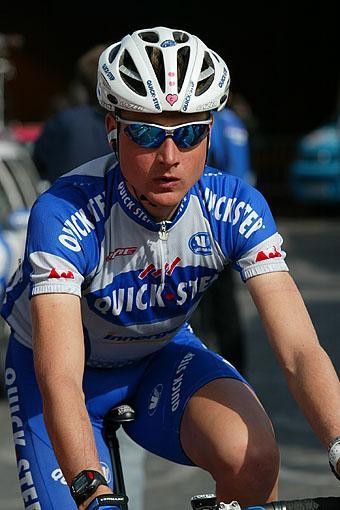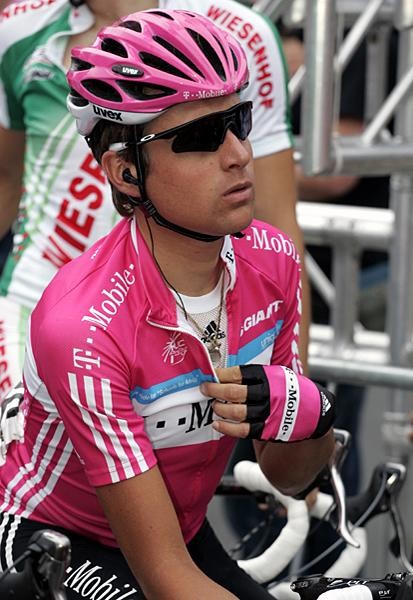Sinkewitz exposes doping details
By Susan Westemeyer Former T-Mobile rider Patrik Sinkewitz has expanded on his tale of doping in an...


By Susan Westemeyer
Former T-Mobile rider Patrik Sinkewitz has expanded on his tale of doping in an interview with a German news magazine on Saturday, confessing that he started with doping in 2003, when he joined Quick.Step. "At that time it was EPO that brought you to the top," he told Spiegel. "Then there were things like cortisone or synacthen [a synthetic hormone -ed.]."
"It was no secret for anybody as to how you could ride faster," he said of his time at the Belgian team. "I learned about it from both riders and team doctors."
The 27-year-old knew how to get around the doping controllers when he was with the Belgian team. "When I knew that a dose could still be detected after five days, then I stopped taking it six days before a race. There were almost never training controls."
"In the first few years I didn't know anything about blood doping," he continued. The young German first learned about it in the summer of 2005. At his first T-Mobile team meeting in November 2005, he "directly asked" team doctors Lothar Heinrich and Andreas Schmid about it. "I was told that it was possible."
The T-Mobile doctors never forced him to do it and "never said that I had to do it." Sinkewitz noted, "The initiative came from me. It was my impression that the Freiburg doctors did it unwillingly, even very unwillingly. But they wanted to be sure that the riders didn't go looking for someone else to do it, where things might go wrong."
Sinkewitz did not find the procedures to be at all risky. "We were working with my own blood," he said. "What could be risky?"
Get The Leadout Newsletter
The latest race content, interviews, features, reviews and expert buying guides, direct to your inbox!
He continued to blood dope up until the first stage of the 2006 Tour de France, despite the fact that team-mates Jan Ullrich and Oscar Sevilla had just been suspended after being named in Operación Puerto. "Actually the doctors didn't want to do it any more, but I said, the blood is there, why shouldn't we use it. What could happen? It was clear anyway that we wouldn't do it any more after the Tour." He received two bags of blood, but there were problems. "They weren't in good condition, the blood simply didn't flow." The bad blood could have proved fatal if it had been injected, proving that the procedure is risky indeed.
The beginning of the end came this summer when Sinkewitz was at a training camp before the Tour. "I had two or three small packages of testosterone gel in my wallet, 25 milligrams each. I smeared the contents of one package on my arm on the evening of June 7, before I went to bed. I just assumed that the amount was too little to be detected."
He was wrong in that assumption. German national anti-doping agency (NADA) controllers showed up at the camp to perform unannounced tests, and Sinkewitz came back positive for testosterone, and he was fired from T-Mobile.
The fact that his positive was made public during the Tour de France gave his case an incredible amount of attention, and the reaction to the news from the German press was so strong that the public television broadcasters quit covering the Tour. "I was the right rider at the right time that everyone could dump on. I was responsible for everything," he complained. "There were many people who used my case in order to get publicity for themselves."
Now that he has been made a pariah, Sinkewitz feels isolated. "I could use help now, but nobody is there," he said.
His confession could help him in one way. The German news magazine Focus reported that Bonn public prosecutors are willing to close their investigation "against a five-figure fine, in light of his confession."
Sinkewitz further hopes that the German cycling federation will be equally merciful and give him a reduced suspension, of only one year. And then he wants to return to riding, for a very simple reason: "I can't do anything else."

Laura Weislo has been with Cyclingnews since 2006 after making a switch from a career in science. As Managing Editor, she coordinates coverage for North American events and global news. As former elite-level road racer who dabbled in cyclo-cross and track, Laura has a passion for all three disciplines. When not working she likes to go camping and explore lesser traveled roads, paths and gravel tracks. Laura specialises in covering doping, anti-doping, UCI governance and performing data analysis.